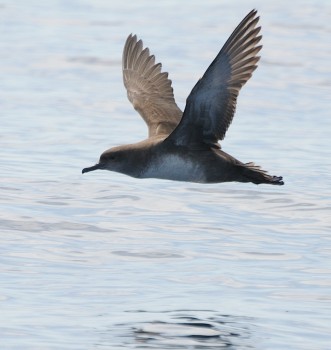Marguerite Tarzia (European Marine Conservation Officer, BirdLife International) and colleagues have published a report that summarizes four years of activities of BirdLife International’s Seabird Task Force which is centred in Europe. Work conducted by the task group has focused on gillnets and sea ducks in the Baltic Sea by Lithuania and in the Mediterranean by the Spanish Seabird Task Force on longliners and shearwaters, notably the ACAP-listed and globally Critically Endangered Balearic Puffinus mauretanicus).

Balearic Shearwater at sea
Information is also given for two other shearwater species considered endemic to the Mediterranean: Scopoli’s Calonectris diomedea (Least Concern) and globally Vulnerable Yelkouan P. yelkouan.
The Spanish Seabird Task Force had two main aims: understanding the bycatch problem in this region and developing and testing solutions to this issue alongside the fishing community. These were addressed through:
1. Making contacts with fishers and assessment of the fishery operating off Catalonia;
2. Placing observers aboard demersal longline vessels to assess the functioning of the fishery and the occurrence of bycatch;
3. Supplying self-reporting logbooks as a complementary method to understand the functioning of the fishery and the occurrence of bycatch, allowing for a wider coverage and focus on the artisanal fleet; and
4. Developing and testing mitigation measures, specifically the viability of using vertical long-lines.
“The Task Force work in Spain provided the opportunity to gain a fine-scale understanding of the seabird bycatch issue in the demersal longline fishery of Catalonia. This work has shown the high heterogeneity of the demersal longline fishery in the Western Mediterranean and enabled the team to gain a clearer understanding of the fishing fleet and its relative risk for seabird bycatch.”
Progress was achieved towards developing a prototype mitigation measure– the adaptation of the Chilean vertical longline- which shows real promise as part of a mitigation measure toolbox.
Read related information here.
With thanks to ‘Pep’ Arcos.
Reference:
Tarzia, M., Arcos, J.M., Cama, A., Cortés, V., Crawford, R., Morkūnas, J., Oppel, S., Rau-donikas, L., Tobella, C., Yates, O., 2017. Seabird Task Force 2014-2017. [BirdLife International]. 85 pp.
John Cooper, ACAP Information Officer, 01 November 2017

 English
English  Français
Français  Español
Español